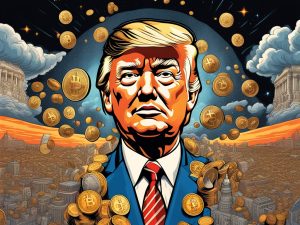The Advantages of DEX Over Traditional Centralized Exchanges
When it comes to trading cryptocurrencies, you have probably heard about centralized exchanges like Binance or Coinbase. They have been widely used by crypto traders for years, providing a platform where you can buy, sell, and trade various digital assets. However, there is another type of exchange gaining popularity lately – decentralized exchanges, or DEX for short. In this article, we will explore the advantages of DEX over traditional centralized exchanges and why you should consider using them.
1. Enhanced Security and Privacy: One of the key benefits of DEX is the increased security it offers. With centralized exchanges, you have to trust a third party with your private keys and personal information. This makes you vulnerable to hacking or identity theft. In contrast, DEX operate on smart contracts, eliminating the need for a central authority to hold your funds. This means you have full control over your assets, reducing the risk of hacking or loss due to exchange compromise.
Moreover, decentralized exchanges prioritize privacy by not requiring you to create an account or provide personal data. You can trade without revealing your identity, enhancing your anonymity and protecting your privacy. This is particularly important for those who value confidentiality in their financial transactions.
2. Peer-to-Peer Trading: DEX allows for direct peer-to-peer trading, eliminating the need for intermediaries. Instead of relying on a centralized authority to match buyers and sellers, DEX connects traders directly through a protocol. This cuts out any middlemen and reduces trading fees since there are no additional costs associated with maintaining a centralized infrastructure. By trading directly with other users, you can enjoy faster transactions and potentially better prices.
Furthermore, peer-to-peer trading offers a level playing field for all participants. In centralized exchanges, large institutional traders often have an advantage, but in DEX, every user has an equal opportunity to participate and contribute liquidity. This promotes a fairer trading environment where individual traders can thrive.
3. Resistance to Market Manipulation: Traditional centralized exchanges are susceptible to market manipulation, especially by those with significant influence or capital. Manipulative activities like wash trading or spoofing can distort market prices, harming smaller traders. However, decentralized exchanges provide a more robust solution to this problem.
DEX operate on blockchain technology, which utilizes decentralized consensus mechanisms to validate transactions. This makes it difficult for any single entity or group to manipulate the market. Immutability and transparency of the blockchain ensure that all trades are recorded and publicly auditable, reducing the risk of fraudulent activities. By using DEX, you can have greater confidence in the integrity of the market and trade with peace of mind.
4. Greater Asset Variety: Unlike centralized exchanges that have limitations on the number and type of cryptocurrencies available for trading, DEX offer a wider range of assets. Since DEX can support any token built on compatible blockchains, you have access to a larger pool of digital assets. This allows you to diversify your portfolio and explore new investment opportunities.
Furthermore, DEX are not limited to cryptocurrencies alone. They can facilitate trading of various digital assets, such as tokens representing real-world assets or even stocks. This opens up new possibilities for investors seeking to explore different markets and asset classes.
5. Increased Decentralization: Decentralization is a core principle of blockchain technology, and DEX truly embody this principle. By removing central authorities, DEX contribute to a more decentralized ecosystem, aligning with the ethos of cryptocurrencies. This not only enhances the security and privacy aspects mentioned earlier but also promotes the democratization of finance.
Decentralization reduces the risk of single points of failure and ensures that no single entity has control over the market. With DEX, the power is in the hands of the users, allowing for more democratic decision-making and community-driven governance. By using DEX, you become an active participant in the decentralized revolution, contributing to a more inclusive financial system.
Frequently Asked Questions (FAQs)
Q: Are decentralized exchanges safe?
A: While no system is completely immune to risks, decentralized exchanges offer enhanced security compared to centralized exchanges. By eliminating the need for a central authority to hold your funds and prioritizing privacy, DEX reduce the risk of hacking or personal data exposure. However, it’s important to note that you should still exercise caution and follow best security practices, such as using hardware wallets.
Q: Do decentralized exchanges charge fees?
A: Yes, decentralized exchanges do charge fees, but they are usually lower than those of centralized exchanges. Since DEX eliminate the need for intermediaries and costly infrastructure, the fees are typically reduced. However, it’s worth checking the specific fees of the DEX you choose, as they may vary.
Q: Are decentralized exchanges suitable for beginners?
A: While decentralized exchanges offer several advantages, they may have a steeper learning curve compared to centralized exchanges. As a beginner, it’s important to familiarize yourself with the decentralized exchange you choose and understand how it operates. However, many DEX platforms are working on improving user experience and simplifying the trading process to make it more accessible to beginners.
Q: Can I use decentralized exchanges to convert cryptocurrencies?
A: Absolutely! Decentralized exchanges allow you to convert one cryptocurrency to another without the need for a centralized authority. This can be especially useful if you want to trade between lesser-known tokens or if you prefer to have more control over your transactions.
Q: Are decentralized exchanges the future of cryptocurrency trading?
A: While it’s difficult to predict the future with certainty, decentralized exchanges are gaining popularity and driving innovation in the cryptocurrency space. Their enhanced security, privacy, and resistance to market manipulation make them an attractive alternative to traditional centralized exchanges. As blockchain technology continues to evolve, it’s possible that decentralized exchanges will play a significant role in shaping the future of cryptocurrency trading.





 By
By
 By
By
 By
By
 By
By
 By
By